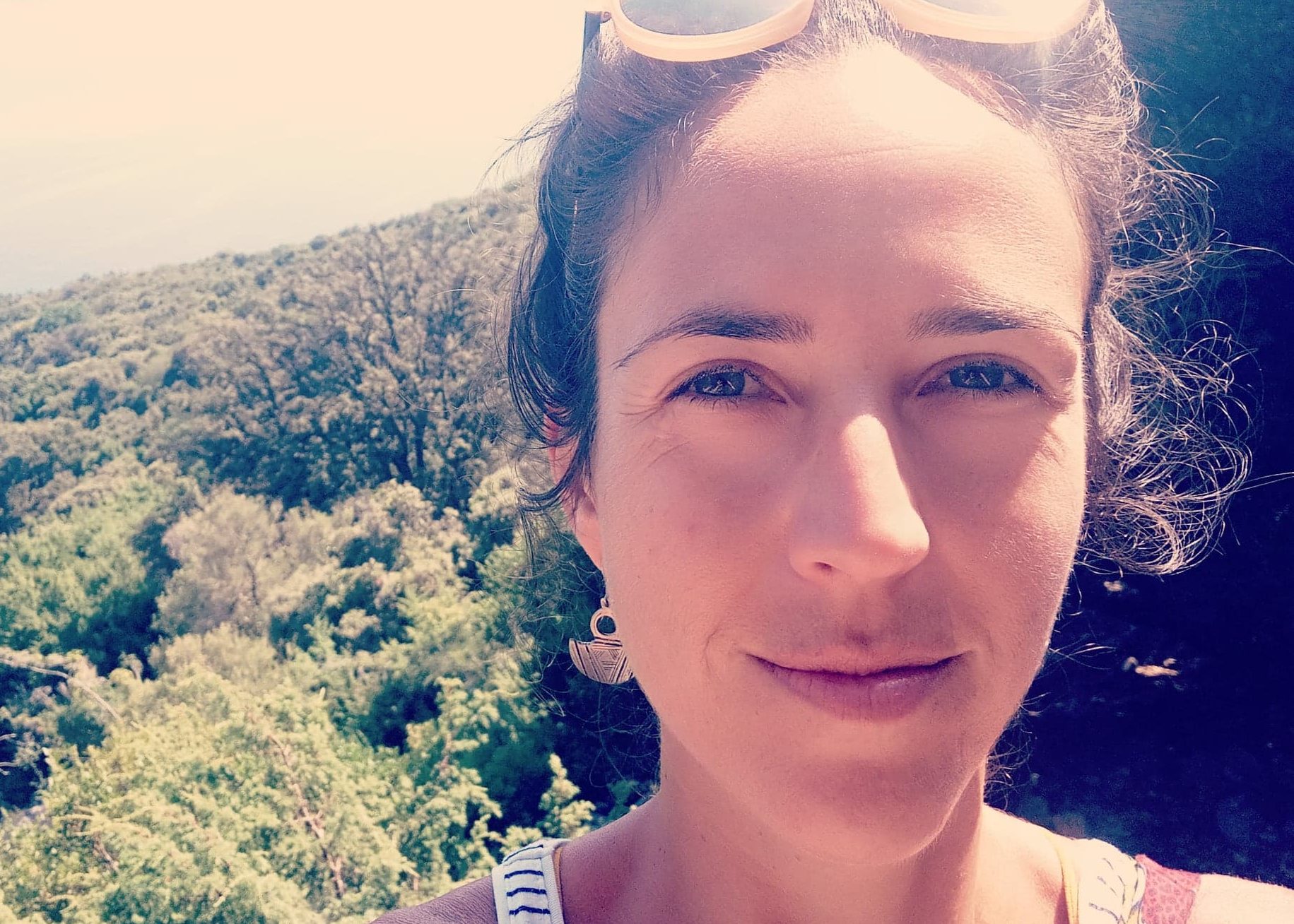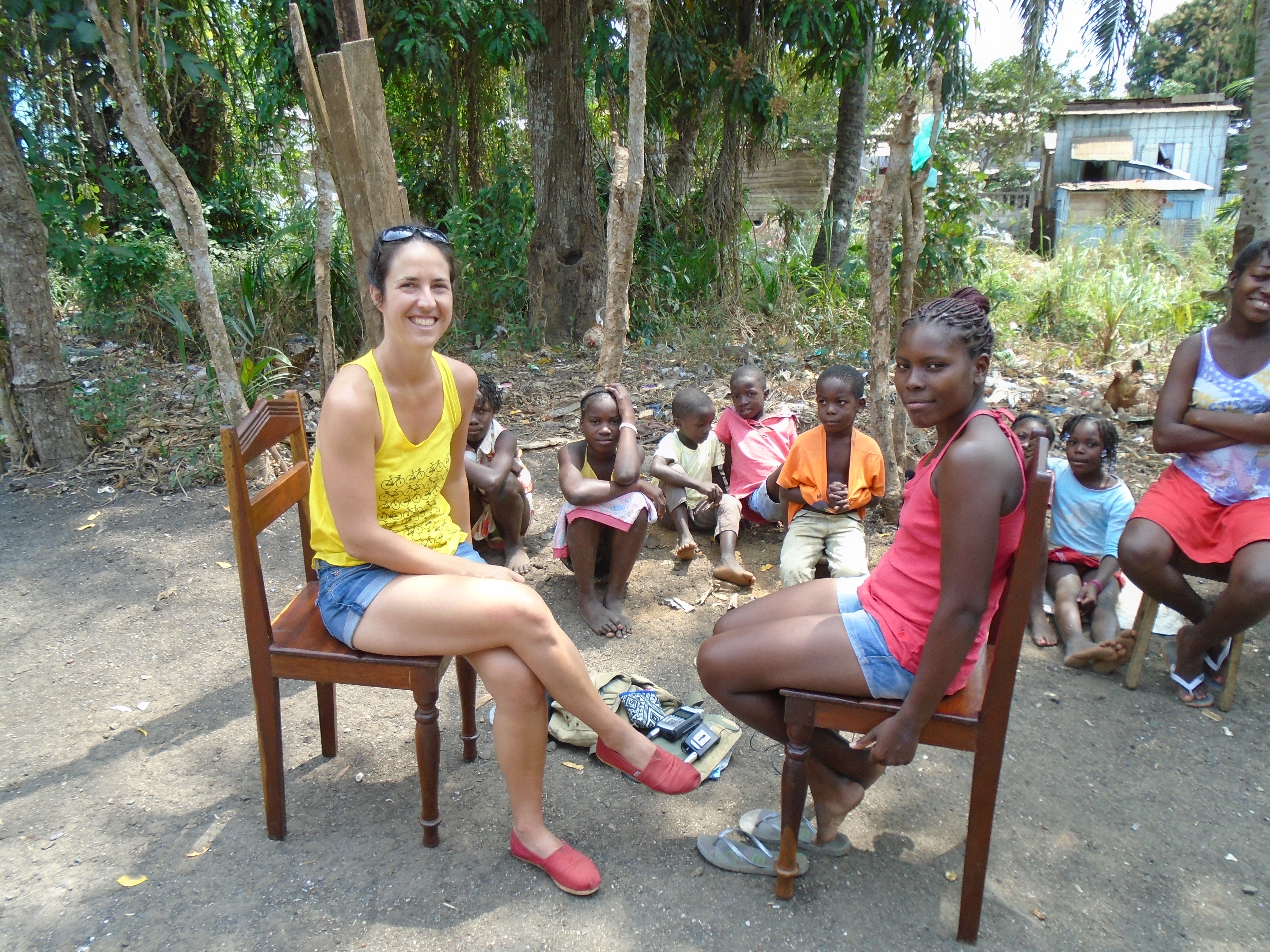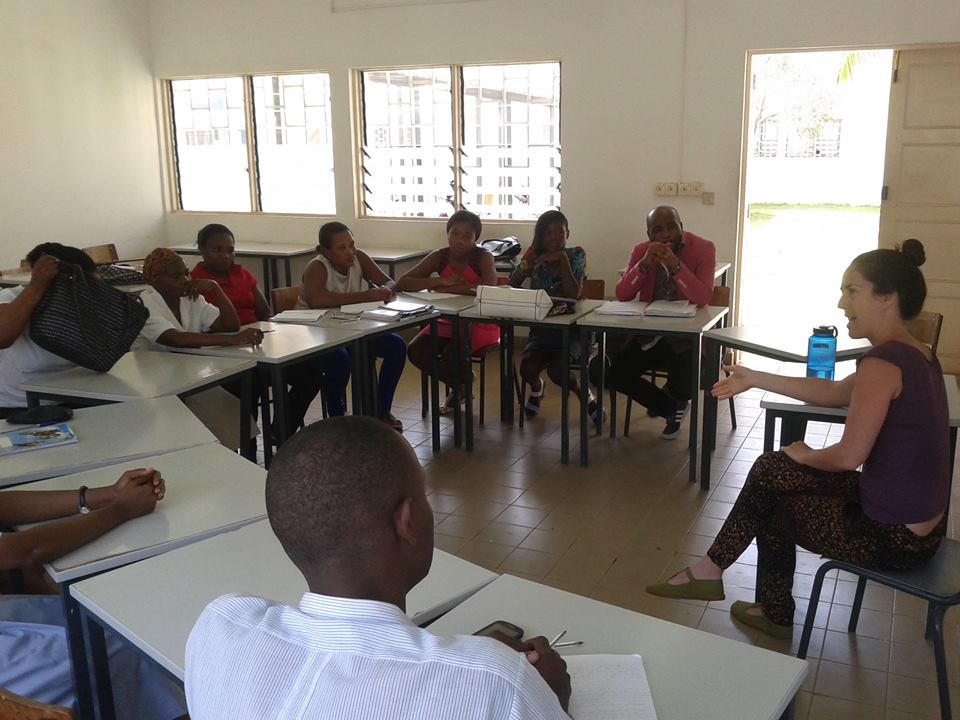Dr. Marie-Eve Bouchard, Assistant Professor of French Studies at UBC, investigates the intersection between language, identities, and ideologies as experienced by young French-speaking immigrants in Canada. She also shares about her time as a sociolinguist in São Tomé and Príncipe.


“I take a raciolinguistic approach to examine how language and race are co-constructed. A raciolinguistic perspective allows us to explore the ongoing processes of racial and linguistic formations within a broader historical, political, economic and sociocultural framework.”
I have always been consumed by an intense interest in language contact – an interest that might take origin in the village where I grew up, which is called Cross Point (Pointe-à-la-Croix in French).
Like the name states, Cross Point is a meeting point: on one side of the main street lives the French Québécois, on the other side the Native American Mi’gmaq, and across the bridge at the end of the main street, English Canadians and French Acadians. Four cultures, three territories, three languages and two varieties of French within less than a kilometer.


Dr. Marie-Eve Bouchard, Assistant Professor of French Studies
Exploring language, identities, ideologies, and belonging among French-speaking immigrants in Canada
This new position in the Department of French, Hispanic, and Italian Studies at UBC will allow me to delve into a research topic that is of great interest to me: French-speaking immigrants in English-speaking Canada.
I am interested in the intersection between language, identities, ideologies, and social belonging as experienced by young French-speaking immigrants in Canada, and in Vancouver more specifically.
Identities are constructed and negotiated in social interactions, and involves a process of negotiation. This means that language is central to the identification processes. In my research, I am interested in studying how young non-white and French-speaking immigrants in Vancouver construct their identities in alignment (or disalignment) with white French- and English-speaking young Canadians.
I take a raciolinguistic approach to examine how language and race are co-constructed. A raciolinguistic perspective allows us to explore the ongoing processes of racial and linguistic formations within a broader historical, political, economic and sociocultural framework. I examine the ideological processes supporting the differentiating of the different varieties of French, and how they are linked to identity.


Research questions
To investigate the role of language and ideologies in the development of a sense of belonging and identities by youth in the culturally and linguistically diverse context of Vancouver, this future research will address the following questions:
- How do young French-speakers (coming from Africa, the Caribbean, Europe, and Canada) experience, enact, and explain their position as linguistic and racial minorities?
- How do they negotiate and navigate the existing raciolinguistic ideologies?
Research goals
Broadly speaking, I also have three main goals for my research agenda as a new young faculty member at UBC.
- I would like to do more work investigating the diversity of language practices among the French-based creole and French-speaking diaspora communities of Vancouver from a raciolinguistic perspective.
- As an anthropologically oriented sociolinguist, I aim to bridge sociolinguistics and linguistic anthropology; these two approaches that are interrelated, and I believe that there is no need to draw a distinction between the two.
- I will build on the research program I have begun as a doctoral and postdoctoral scholar, which is focused on language change, language shift, and language contact from a language ideology perspective.
Hampton Fund New Faculty Grant
I have received the Hampton Fund New Faculty Grant to initiate a new research project here at UBC. This Hampton project proposes to work with French learners at UBC so as to provide preliminary documentation of the attitudes they hold toward different varieties of spoken French. It addresses the following research questions:
- What are the positive and negative attitudes that French learners at UBC have toward different varieties of French?
- How are the different varieties of French hierarchized in the discourse of non-native speakers of French at UBC?
Addressing these questions will provide a foundation for longitudinal research on language attitudes in Canada.
Looking forward to UBC
Starting this new position in the middle of the pandemic is… strange! But I very much look forward to working with students and colleagues across disciplines in the rich intellectual environment that UBC offers. UBC also provides great opportunities to continue learning and engage with our communities as a scholar and an active citizen. Joining UBC also means living in Vancouver – which, in itself, is very exciting!
Past experiences in the “Labyrinth and Laboratory of Languages”


Doing an interview in São Tomé and Príncipe—and attracting many onlookers!
When I was preparing my doctoral research, São Tomé and Príncipe appeared to me as an ideal site for my field work because everything there was still to be discovered. This tiny country, invisible in many maps, is characterized by its great linguistic diversity, and has been called a “labyrinth and laboratory of languages” (translated from Hagemeijer, forthcoming).
I went to São Tomé Island for a first period of three months in 2015 and realized how rich this country is for a sociolinguist. It would allow me to investigate all that I am interested in, as it has an emerging variety of Portuguese, three creole languages on different stages on the vitality scale, and material to investigate language ideologies, language contact, variation and change, language and identity, and construction of ethnicized and racialized individuals and groups. São Tomé became my home and my research playground for two and a half years, as I was funded by the Social Sciences and Humanities Research Council of Canada, as well as the MacCraken Fellowship and the Max Talmey Prize from New York University.
In September 2017, I defended my dissertation, which examines the use of rhotics and subject pronoun expression among Santomeans, as well as the ideologies that surround the use of these features and the languages of the islands. This work fills gaps in the literature related to understanding ongoing language change from below, as well as how language can be a tool of ethnic and national identity.
As a postdoctoral fellow (funded by the Swedish Wenner-Gren Foundations, with the support of Stockholm University – 2018-2020), I carried out a new research project to include the Santomean diaspora to my studies. This research aimed to reveal how the variety of Portuguese spoken by Santomeans in Portugal varies from the one spoken in São Tomé. Specifically, the project proposed to examine the speech of migrants in order to investigate the impact (or not) of language contact. I am currently working on two different publications related to this research.


Giving a talk at the University of São Tomé and Príncipe.
——-
Learn more about Dr. Marie-Eve Bouchard.
Hagemeijer, Tjerk. (Forthcoming). São Tomé e Príncipe: Labirinto e laboratório de línguas. In Gerhard Seibart (org.), Arquipélagos crioulos: Cabo Verde e São Tomé e Príncipe numa perspectiva comparada. Lisbon: Vega.


